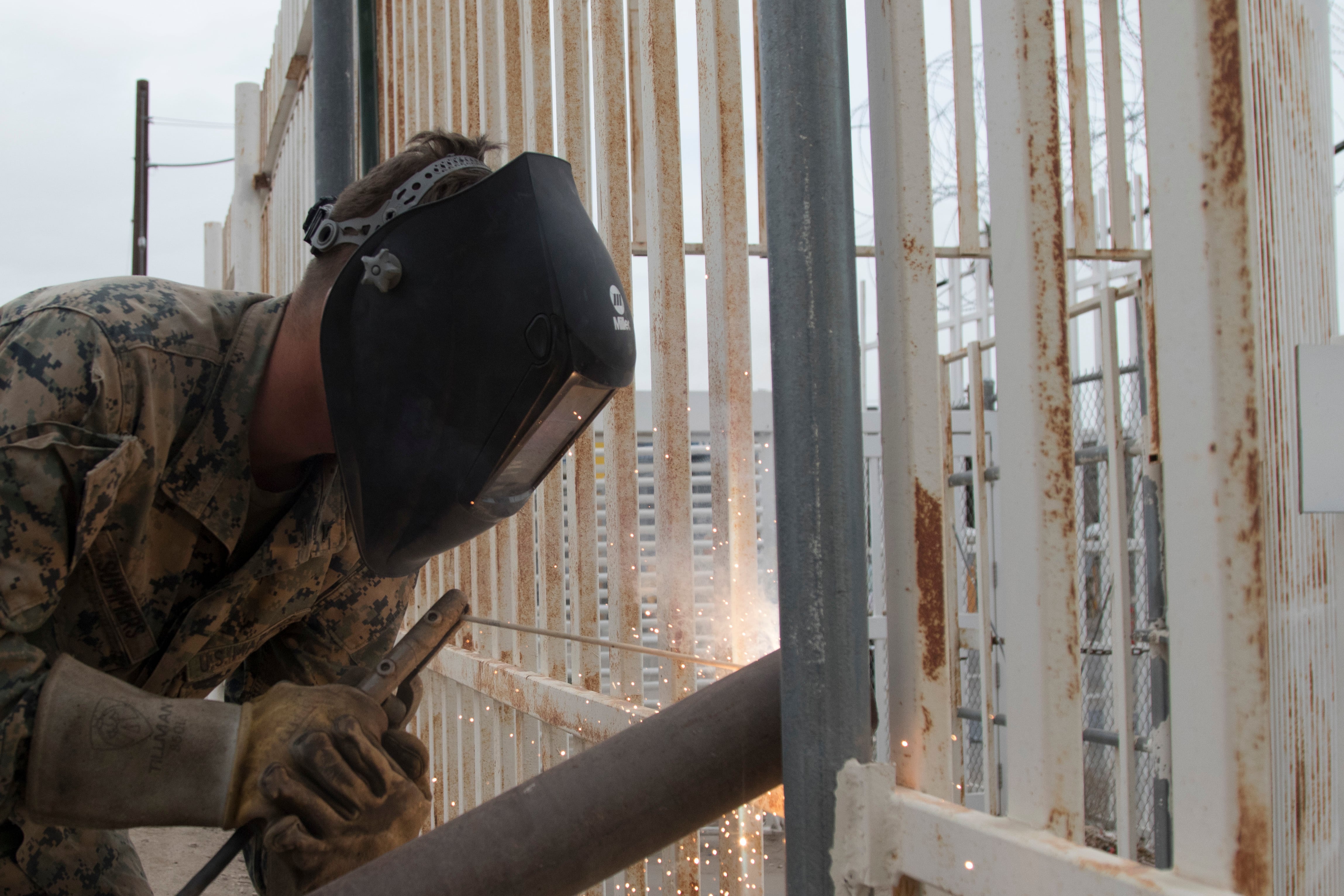WASHINGTON ― Democratic lawmakers want the head of the Pentagon to drop plans for military personnel to directly interact with migrants on the U.S. southern border, arguing it could violate America’s long-standing separation of the military and law enforcement.
In the latest flashpoint in the military’s growing role at the border, 19 Democratic senators, including several presidential hopefuls, sent a letter to acting Defense Secretary Patrick Shanahan on Wednesday urging him to revoke waivers he granted to nearly 280 of the more than 4,000 troops on the border. They also want a legal justification for “military protective activities” that President Donald Trump has authorized troops to perform.
“We urge you to revoke these waivers to prevent the continued escalation of military involvement in immigration enforcement activities and the further politicization of the use of servicemembers to inappropriately respond to a divisive domestic policy issue,” reads the letter, led by Sen. Richard Blumenthal, D-Conn., and a senior member of the Armed Services and Judiciary committees. The letter was obtained by Defense News.

Several presidential hopefuls joined the letter, including Michael Bennett, Cory Booker, Kirsten Gillibrand, Kamala Harris, Bernie Sanders and Elizabeth Warren ― as well as the Senate Armed Services Committee’s ranking member, Sen. Jack Reed, D-R.I., and the ranking member of the Senate Appropriations Committee’s Subcommittee on Defense, Sen. Richard Durbin, D-Ill.
For troops on the border, the mission in support of the Department of Homeland Security has involved reinforcing barriers and providing logistics support, but typically not directly engaging with or detaining immigrants or asylum seekers.
The lawmakers targeted the Defense Department’s agreement to provide 160 personnel to transport migrants, 100 personnel to distribute meals and conduct welfare checks, and 20 military attorneys to represent DHS and Immigration and Customs Enforcement in immigration court and before the Board of Immigration Appeals.
The lawmakers requested legal justification for Trump’s authorization for military protective activities, which include “a show or use of force (including lethal force, where necessary), crowd control, temporary detention, and cursory search” if deemed necessary to protect Customs and Border Protection personnel.
RELATED

Fearful that troops could breach the law, “under the pretense of humanitarian assistance,” they also request details of the training and legal guidance for border troops on the use of force and the Posse Comitatus Act, which restricts active-duty military participation in domestic law enforcement activities.
The law, which was enacted in 1878, was intended to end the use of federal troops to supervise elections in the former Confederate states. More generally, though, it reflected an uneasiness with a military role in domestic law enforcement, and a philosophical commitment to subordinating military power to civilian authority.
On Wednesday, Durbin grilled Shanahan at a hearing on the defense budget, arguing that the longer the deployment goes on, the greater the risk of breaching the military-law enforcement divide.
“There will never be a blurring of the line in terms of law enforcement,” Shanahan said in an appearance alongside Joint Chiefs Chairman Gen. Joseph Dunford. “We do not provide law enforcement. Never have. Never will. Our role is to support DHS.”
Senate Appropriations Committee Chairman Sen. Richard Shelby, R-Ala., noted that the Department of Defense has made at least seven supplemental appropriations for the border missions since DHS first asked for its aid last year. Meanwhile, Durbin wanted to know why the mission wasn’t in the DoD’s fiscal 2020 budget request.
“This is an issue that Gen. Dunford and I work on quite a bit because the question that he and I are really trying to answer is how long will we be at the border,” Shanahan said, adding that the military is required at the border due to a shortage of Customs and Border Protection personnel, saying “they’re thousands of people short.”
“We’ve initiated a set of actions to really understand how many people are they short because we need to get that into a sustained environment, we’re driving buses, we’re serving food, we’re doing medical support, we’re doing logistics support. For now, we haven’t degraded any readiness but we really need to get back to our primary missions and continue to generate readiness,” Shanahan said.
RELATED

Dunford said he is lending DHS a two-star assistant to the Joint Chiefs who would typically work with the State Department, and number of military planners, to create an interagency planning team. They would create a plan for DoD support to DHS based on the number of migrants and DHS’ capacity.
“Although the commitment on the border hasn’t impacted our preparedness for other missions at this point, what we wanted to do was get into a more predictable mode for the requirements that the Department of Homeland Security has and do better at integrating across the government,” Dunford said. “What we’re hoping to do for the secretary of the Department of Homeland Security is have a much more predictable plan for the next couple of years."
Trump and congressional Democrats are locked in a monthslong battle over funding for his border wall proposal, which culminated in an extended partial government shutdown at the start of the year.
In February, Trump announced plans to use more than $3 billion in unspent military construction funds to advance the wall project, over the objection of Congress. Pentagon officials promised they will replace that money in future years, but lawmakers would have to approve such a move.
RELATED

Generally, congressional Republicans have shown support for the border mission and Trump’s tactics in obtaining funding. However, the Judiciary Committee’s chairman, Sen. Lindsey Graham, R-S.C., and an ally of the president, indicated Wednesday he wants to the Posse Comitatus Act’s restrictions protected.
“Bottom line is our military does not engage in traditional law enforcement functions,” he said. “Providing assistance to the border patrol is fine, but our soldiers should not become border patrol agents.”
In recent weeks, Trump has called the situation on the southern U.S. border increasingly dangerous, and he publicly chafed at legal restrictions placed on troops he’s sent there.
“Our military, don’t forget, can’t act like a military would act,” Trump said in April. “Because if they got a little rough, everybody would go crazy. … They have all these horrible laws that the Democrats won’t change.”
Leo Shane III contributed to this report.
Joe Gould was the senior Pentagon reporter for Defense News, covering the intersection of national security policy, politics and the defense industry. He had previously served as Congress reporter.








